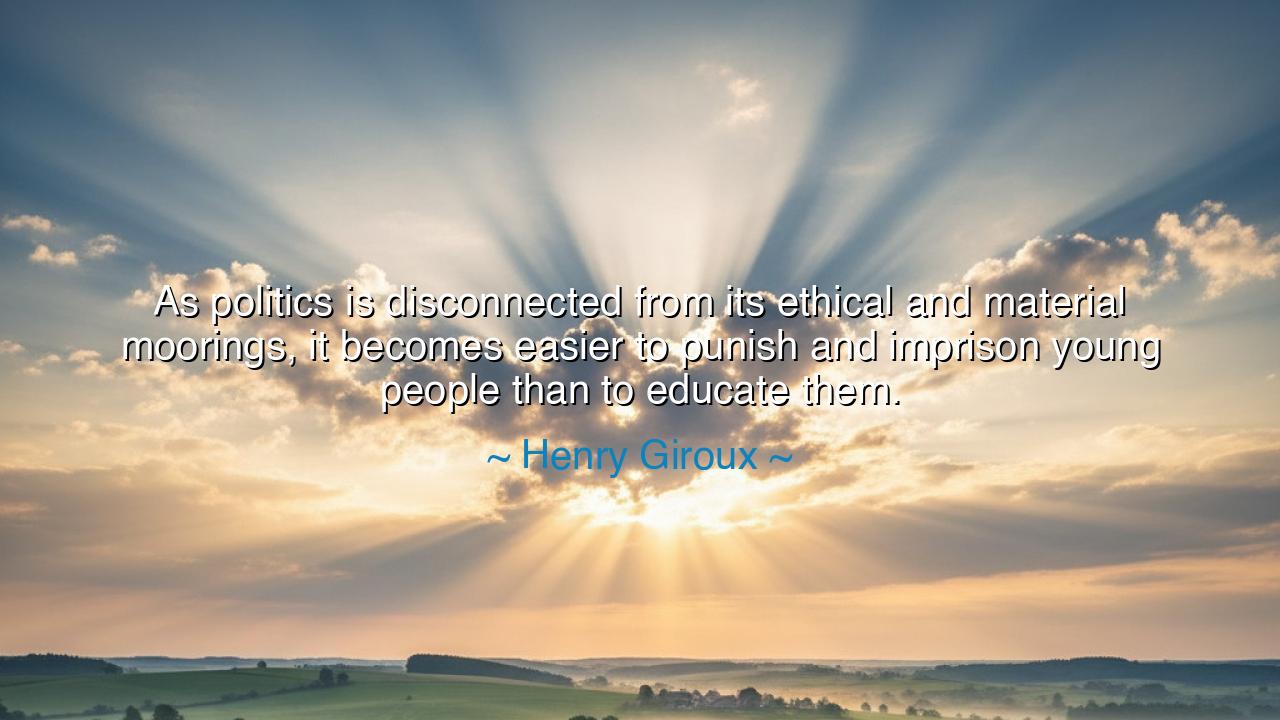
As politics is disconnected from its ethical and material
As politics is disconnected from its ethical and material moorings, it becomes easier to punish and imprison young people than to educate them.






Politics, when it loses its soul, becomes a weapon rather than a shield. When Henry Giroux declared, “As politics is disconnected from its ethical and material moorings, it becomes easier to punish and imprison young people than to educate them,” he spoke of a tragic transformation: the moment when those in power cease to view governance as a sacred duty to uplift society and instead use it as a means to control and oppress. His words are a warning that when ethics and justice are severed from political decisions, a nation begins to devour its own children, forsaking education and opportunity for chains and punishment.
At the heart of Giroux’s wisdom lies the understanding that education is liberation. A society rooted in compassion and vision seeks to nurture its youth, to provide them with tools of knowledge and pathways to dignity. But when politics becomes corrupted—driven by greed, fear, or authoritarianism—it abandons this noble task. It is far easier for rulers to silence and imprison young voices than to face the hard work of reforming broken systems. Thus, prisons grow while schools decay, and the energy of youth, which could have built the future, is instead shackled and destroyed.
History offers a chilling example in the fate of Socrates in ancient Athens. Though not young himself, Socrates was a teacher who inspired young minds to question authority and seek truth. When the political powers of his time became disconnected from ethical ideals, they viewed his teachings as dangerous. Instead of fostering dialogue and growth, they chose to silence him with a cup of hemlock. In this act, Athens revealed the same sickness Giroux describes: the preference to punish rather than educate, to maintain control rather than cultivate wisdom.
A more modern echo can be seen in the Civil Rights Movement of the 1960s. Many young activists, filled with hope and determination, sought to challenge unjust laws through peaceful protest. Instead of meeting these voices with dialogue and reform, political leaders often responded with violence and imprisonment. The sight of young people beaten and jailed for demanding equality became a powerful indictment of a political system that had lost its moral foundation. It was easier to repress them than to confront the deep injustices their cries exposed.
Giroux’s words also speak to the responsibility of leaders. Politics, at its best, is not merely about maintaining order but about creating conditions in which people can thrive. When leaders forget this, when they become disconnected from the material realities of poverty, inequality, and suffering, they no longer see the humanity of the youth they govern. The young become threats to be neutralized, not citizens to be nurtured. This failure dooms a society to cycles of unrest and despair.
Let this teaching be carried forward: a nation’s future lives in its youth. To educate them is to build hope; to punish them is to destroy the seeds of tomorrow. As Giroux warns, when politics forsakes ethics, it ceases to guide and begins to enslave. May future generations remember that true power lies not in cages or weapons, but in classrooms, libraries, and the boundless potential of young minds set free to dream and create.






AAdministratorAdministrator
Welcome, honored guests. Please leave a comment, we will respond soon